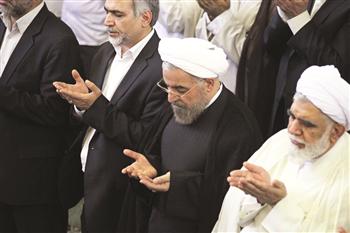Stop Looking for ‘Moderate’ Shiites and Address Interests
World Politics Review |

By PARAG KHANNA
Even those in America who call for a more humble American foreign policy and recognize the need to listen to foreign populations and global public opinion persist in deploying at every possible moment the most patronizing of monikers in describing their preferred allies: "moderate."
Over the past eight years, the condescending label of moderate has been applied to a variety of potential interlocutors in regional conflicts -- with never a positive result. Negotiations with so-called "moderate Taliban" proved a failure; Taliban interests and unity certainly outweighed any incentives the U.S.-backed Karzai regime could muster. The much lauded effort in Iraq's Anbar province to work with "moderate Sunni" may also backfire: Al-Qaida in Iraq has been weakened, but there has been no political progress on the national level and, thanks to U.S. weapons, the Anbar Sunnis are now armed to the teeth. Then there was the arming of the "moderate Palestinians" of Fatah over the "militants" of Hamas, which made the latter even more merciless in its takeover of Gaza, splintering the Palestinian state both geographically and politically. In each case, the label is little more than a kiss of death, showing the weakness of those leaders who accept it and become puppets of the Bush administration, such as Jordan's King Abdullah. Now the U.S., through public diplomacy and other means, is sponsoring efforts to seek out "moderate Shiites" in the crescent of Shiite-majority Arab countries stretching from Lebanon through Bahrain to Iraq. Major American think tanks host conferences to identify and distinguish moderate Shiites and use them as a bridgehead to dampen Iranian-sponsored unrest among oppressed Shiites in these either monarchic or chaotic nations. As with all other examples of attempting to co-opt so-called moderates, these efforts should be seen for what they are: window-dressing for an attempt to isolate opponents such as Iran rather than genuine efforts to recognize the geography, history, demographics and national interests of people in the region and push for pragmatic solutions based on these factors. The search for "moderate Shiites" presents an exceptional and ironic problem: There is no such thing. It is not that one cannot find secular, democratic Shiites as one can with Sunnis. Indeed, perhaps all Shiites are so except for Iran's ruling clerics. But most of them also are uninvolved in politics, leaving the reality that we must reach out to Shiite groups that are rooted in local and national political movements. Strictly speaking, if the Bush administration wants to negotiate with moderate Shiites, it should speak directly with Lebanese Hezbollah, an organization that has abandoned the idea of an Islamic republic and, with the most recent peace conference in Qatar, accepted a greater official political role in Lebanon's multi-confessional parliamentary system. Given the recent history of failed imaginary segregation of foreign societies, a more serious plan has never been more necessary. Addressing Iran's concerns of being surrounded by American troops and nuclear powers won't come through a limp attempt at Shiite rollback, nor through a simple bilateral dialogue with the United States. The respect and recognition Iran seeks can only be achieved through a regional security conference long proposed and never implemented. Numerous recent surveys make clear that the majority of Iranians favor greater foreign investment and diplomatic and social exchanges with the West -- a "grand bargain" that could do far more to change the Tehran regime's behavior than isolated support for a few "moderate Shiites." Israeli opposition to convening the key regional players -- Iran, Saudi Arabia, Iraq, Israel, Lebanon, and smaller Gulf statelets -- together with the major outside players -- the EU, U.S., Russia and China -- has been a needless drag on advancing a dialogue that should have begun years ago. Israel's inhibitions have created a chicken-and-egg problem: It won't negotiate until its existence is recognized, but such recognition will only come with credibility earned through negotiation. The United States has long ceased to be considered an honest broker in the region, and Tony Blair was nothing if not an ironic choice to be the Quartet's special representative for regional conflicts, given Britain's legacy in the region and his closeness to the Bush administration. The EU, which has security interests in the region given the terrorist threats it faces, economic interests given its energy relationships with Iran and now even Iraq, and even a military peacekeeping presence in Lebanon already, is perhaps the only trusted outside power which could convene such a regional process to deescalate Mideast tensions. Whoever brings together the hostile actors, who are permanently locked in one complex constellation, the effort should be based on assessing declared interests, not on parochial American diktats to allow only "moderates" a seat at the table.